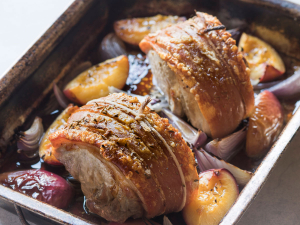Editorial: Happy days
OPINION: The year has started positively for New Zealand dairy farmers and things are likely to get better.
 Scientists at AgResearch are examining how factors like gender and pH values impact the eating quality of pork.
Scientists at AgResearch are examining how factors like gender and pH values impact the eating quality of pork.
Researchers are investigating what makes great-tasting pork as part of an innovative eating quality project.
Scientists at AgResearch are examining how factors like gender and pH values impact the eating quality of pork.
Consumer testing will help the researchers evaluate attributes such as aroma, tenderness, juiciness, flavour, overall perception of quality, and how likely they would be to purchase the pork.
The New Zealand pork industry aims to use the findings of the study to develop a quality mark for pork so Kiwis can be confident they’ll have a consistently excellent eating experience every time.
The research is a collaboration between NZPork and the Ministry for Primary Industries (MPI), through its Sustainable Food and Fibre Futures fund.
NZPork is contributing $59,875 to the research project with MPI’s Sustainable Food and Fibre Futures fund investing $45,000 and FreshPork $4,648.
AgResearch senior scientist Carolina Realini says she and her colleagues will focus on consumer sensory testing with pork loin from different genders and at different pH levels.
“We’ll draw on the eating experiences of a group of consumers to gain insights into what they perceive from different treatments. The findings of this consumer study will then lead to independent written findings that can be drawn on by the industry.”
NZPork chief executive Brent Kleiss says although New Zealand born and raised pork is of a high quality from an environmental and animal welfare perspective, there is no verifiable programme to measure eating quality.
“The findings will give us valuable information and insights about just how much pig gender and pH factors enhance or lessen the eating experience. This is about the industry ensuring Kiwis can be confident about the quality of New Zealand born and raised pork.”
“Pork is one of the most popular proteins in the world, but some people still believe all pork is a fatty meat. However, most cuts of pork are quite lean when the external fat (which is easy to remove) is cut off, the same as you might do for other meats,” says Kleiss.
Steve Penno, MPI’s director of investment programmes, says the knowledge about developing a consistently high-quality product will be an especially valuable part of the project.
“Better understanding of what leads to pork with attributes consumers enjoy most will help farmers raise a premium homegrown product.”
The research is expected to be completed early next year.
Additional reductions to costs for forest owners in the Emissions Trading Scheme Registry (ETS) have been announced by the Government.
Animal welfare is of paramount importance to New Zealand's dairy industry, with consumers increasingly interested in how food is produced, not just the quality of the final product.
Agriculture and Forestry Minister Todd McClay is encouraging farmers and growers to stay up to date with weather warnings and seek support should they need it.
The closure of SH2 Waioweka Gorge could result in significant delays and additional costs for freight customers around the Upper North Island, says Transporting New Zealand.
OPINION: The year has started positively for New Zealand dairy farmers and things are likely to get better.
Ministry for Primary Industries (MPI) Director General Ray Smith believes there is potential for an increase in dairy farming in New Zealand.